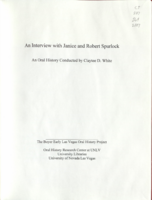Search the Special Collections and Archives Portal
Search Results

Transcript of interview with Mark Hall-Patton by Claytee White and Stefani Evans, August 25, 2016
Date
Archival Collection
Description
Mark Hall-Patton, administrator of Clark County Museums and since 2008 a frequent guest on the popular cable television show Pawn Stars, was born in 1954 in San Diego, California. His mother was a registered nurse and his father served in the United States Navy. From early childhood, Mark’s interest in history and museums shaped his path in life. After graduating high school in Santa Ana, California, he earned his Bachelor’s degree in history at nearby University of California, Irvine. Degree in hand, Mark worked for Bowers Museum in Santa Ana and founded the Anaheim Museum in 1984. He moved to Las Vegas, Nevada in 1993 to create the Howard W. Cannon Aviation Museum in McCarran International Airport. By 2008, Mark had become administrator over all Clark County museums. In this interview, he explains the various ways his involvement with the popular Pawn Stars program has turned “the museum guy” into a brand, introduced production companies to the value of filming in Las Vegas, increased Clark County museum visits and donations, and raised popular awareness of the academic fields of history and museum studies.
Text

Maria Casas interview, June 12, 2019: transcript
Date
Archival Collection
Description
Interviewed by Maribel Estrada Calderón. Farmersville is described as a small town between, Exeter and Visalia, California populated by Mexican American farm workers. It is in this small town, where UNLV History Professor Maria Raquél Casas spent her childhood raised along with her sisters and brothers. In her interview, Dr. Casas describes how growing up in this small town with her traditional Mexican family influenced the person she is today. While working alongside her family in the fields, Dr. Casas decided that she would strive to obtain an education. Through hard work and constant support from her sister, Dr. Casas attended Fresno State, where she discovered her love for history. Upon completing her undergraduate program, Dr. Casas made the decision to further her education by pursuing a master's at Cornell University. At Cornell, she faced discouraging professors who believed she would not be able to complete the master's program let alone pursue a PhD program. Despite these demoralizing professors, Dr. Casas completed her program and was admitted into University of California Santa Barbara's history program. Dr. Casas never forgot her roots or the significance of her presence in the majority white academic spaces she attended during her academic journey. When she arrived at UNLV, she continued to strive for more Latino representation in both the student population and in the school faculty. During her tenure at UNLV, Dr. Casas has served as an advisor for multiple Latino student organizations including MEChA and SoL. Dr. Casas has witnessed much progress in Latino representation at UNLV, but she believes there is still much work left to be accomplished.
Text

Transcript of interview with Janice and Robert Spurlock by Claytee White, June 17, 2010
Date
Archival Collection
Description
Janice and Robert Spurlock were married in 1990 and each has a lifetime of Las Vegas memories. They have made Sandy Valley home for nearly 32 years. Together the couple recalls the people and places of Las Vegas' past from their points of view during this oral history interview. For Janice the stories begin in the 1930s after her family moved to Las Vegas from California. She was a youngster of about five. Among the topics she talks about is walking to Fifth Street Grammar School, graduating from Vegas High School, and fun had during Helldorado Days. In 1953, Robert arrived. He was a young man headed from Arizona to Colorado seeking work as a welder. He stopped in Henderson, Nevada and never quite made it out of the area. For the next two decades he worked construction and helped build many local landmarks. He shares stories about the range wars and about being accidentally exposed to radiation from the Nevada Test site.
Text

Patricia Lappin interview, February 26, 1980: transcript
Date
Archival Collection
Description
From the Ralph Roske Oral History Project on Early Las Vegas collection OH-01063. On February 26, 1980, Nancy Bright interviewed school teacher, Patricia Lappin (born April 14th, 1924 in Denver, Colorado) at Robert L. Taylor Elementary School in Henderson, Nevada. The interview covers Boulder City, Nevada around Hoover Dam. The two discuss the different gambling habits between Southern Nevada locals and Las Vegas tourists. During the latter half of the interview, the two speak at length about the impact of nuclear waste on Nevada. Lappin explains the unique issues that Southern Nevada faces as one of three states to accept nuclear waste.
Text

Barbara Millington interview, March 2, 1980: transcript
Date
Archival Collection
Description
On March 2, 1980, collector David Mowrey interviewed Barbara Millington (born July 3rd, 1937 in Oak Creek, Colorado) at her home in Las Vegas, Nevada. In this interview, Mrs. Millington discusses moving to Las Vegas, Nevada with her family and working various jobs including at Vegas Village and becoming a bookkeeper at a construction firm. She also speaks about the changes she has seen in Las Vegas, such as how casinos were when she first came here compared to how they are now. She ends the interview talking about the need for Las Vegas to find industry outside of gaming. She discusses the need for young people to come back after going away to college to improve the city.
Text

Paul Sogan interview, May 16, 1995: transcript
Date
Archival Collection
Description
Interviewer: Dennis McBride
Text

Transcript of interview with Toshiyuki "George" Goto by Christina Oda, February 26, 1979
Date
Archival Collection
Description
On February 26, 1979, Christina Oda interviewed Toshiyuki “George” Goto (born 1922 in Huntington Beach, California) about his life in Nevada. Goto first talks about his move to Nevada in 1951 before talking about his family, church activities, politics, and recreational activities. He then discusses the building, economic, and environmental changes in Las Vegas. Goto later talks in depth about his profession in landscaping, including the work he completed for some of the hotels and resorts built on the Las Vegas Strip. The latter part of the interview includes discussion about Goto’s Japanese ancestry and his perceptions as a minority when first moving to and living in Las Vegas. The interview’s conclusion covers the topics of social activities and Goto’s organization of a local chapter of the Japanese American Citizens League.
Text

Transcript of interview with Alexandar Grayson by David Glasco, March 15, 1981
Date
Archival Collection
Description
On March 15, 1981, collector David Glasco interviewed card dealer, Alexander Grayson (born March 27th, 1952 in Durham, North Carolina) in his home in Las Vegas, Nevada. This interview covers the black experience in Las Vegas. Mr. Grayson also discusses prejudice, racism, education, and entertainment. Additionally, he recalls relocating to Las Vegas from North Carolina with his family when he was a child, as his father was in the Air Force.
Text

Transcript of interview with Celia Rivero Grenfell by Patricia Hollard, March 31, 1977
Date
Archival Collection
Description
On March 31, 1977, Patricia Holland interviewed Celia Rivero Grenfell (born 1926 in Las Vegas, Nevada) about her life in Southern Nevada. Grenfell first talks about her family background in Mexico and later describes her family’s restaurant business. She also describes her education, recreational activities, Downtown Las Vegas, and Helldorado. The two also discuss racial segregation and prejudice, the El Rancho Vegas, Lorenzi Park, early churches, environmental changes, early air conditioning, and Grenfell’s early work in a laundry business.
Text

Transcript of interview with Ethel S. Hatch by P. Kohlman, November 24, 1975
Date
Archival Collection
Description
On November 24, 1975, collector P. Kohlman interviewed housewife, Ethel S. Hatch (born April 11th, 1914 in Valentine, Texas) in her home in Las Vegas, Nevada. This interview covers the history of Las Vegas from 1939 to 1975. Mrs. Hatch also talks about ranching in Nevada, Rex Bell, development on the Strip, the first hotels, and early local shopping culture. She refers to Block Sixteen as Block Thirteen when discussing the Red Light District. The interview concludes with discussion surrounding tree-lined streets, the Helldorado Club, and Fremont Street.
Text
